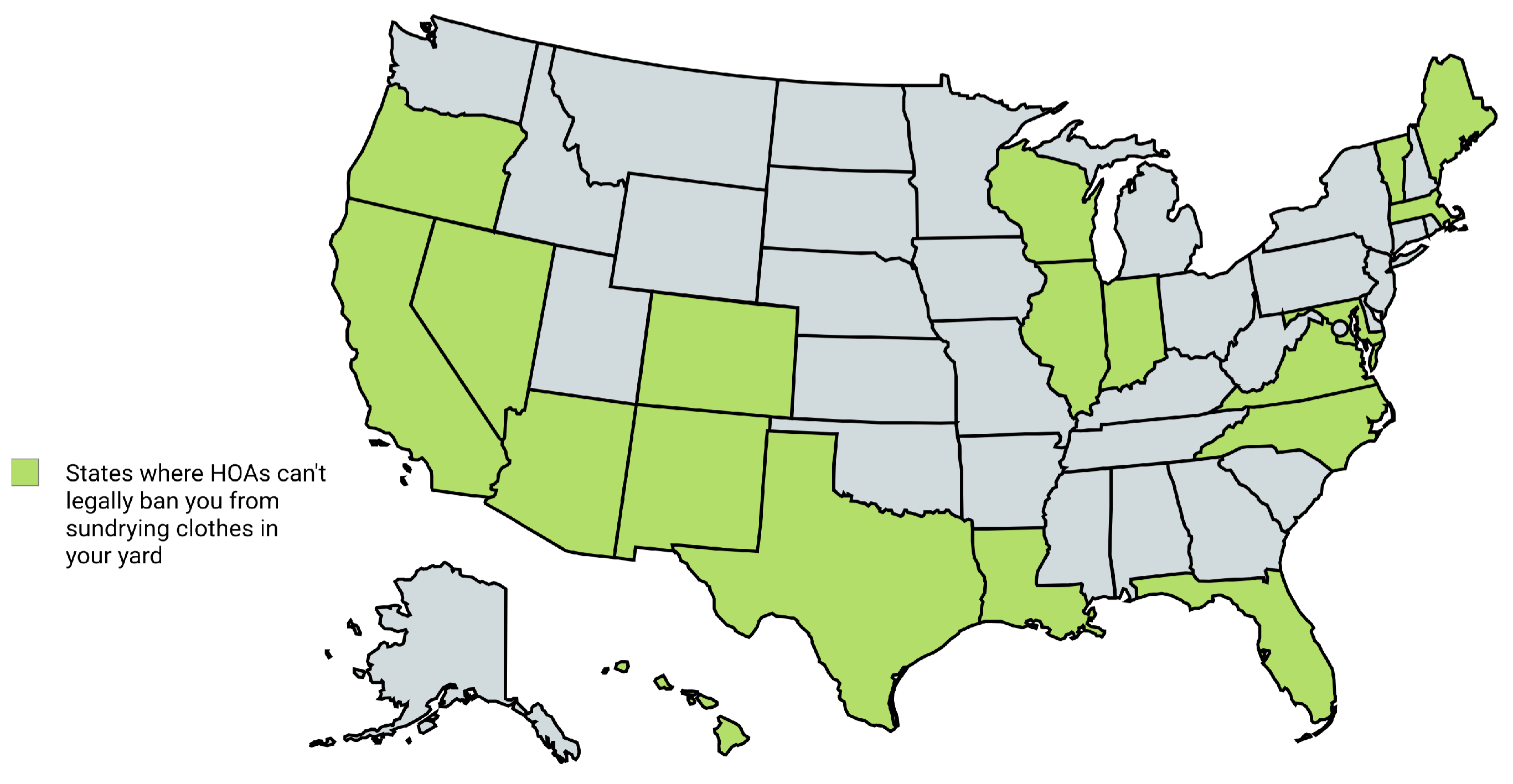Map of States Where HOAs Can't Ban Sundrying Clothes


Alex Cartwright
Senior Cartographer & GIS Specialist
Alex Cartwright is a renowned cartographer and geographic information systems specialist with over 15 years of experience in spatial analysis and data...
Geographic Analysis
What This Map Shows
This map illustrates the states in the U.S. where homeowners' associations (HOAs) are legally prohibited from banning residents from sundrying clothes in their yards. While this may seem like a niche issue, it reflects broader societal trends regarding individual rights, environmental consciousness, and community governance. The ability to sundry clothes is not merely a personal choice; it can symbolize a commitment to sustainability and a connection to the natural world.
Deep Dive into Sundrying Clothes and Homeowners' Associations
Sundrying clothes is a practice that dates back centuries, offering a natural and energy-efficient alternative to drying clothes in a dryer. It’s an eco-friendly practice that has gained renewed interest in the context of increasing energy costs and environmental awareness. However, in many residential areas governed by HOAs, regulations can dictate how homeowners maintain their properties, including the visibility of laundry hanging outside.
Interestingly, the debate over sundrying often pits environmental values against aesthetic concerns. Many HOAs argue that clotheslines detract from property values or spoil the uniform appearance of neighborhoods. Yet, as energy prices rise and climate change concerns escalate, more residents are advocating for their right to dry clothes outdoors.
In recent years, several states have enacted legislation that protects residents' rights to sundry clothes, making it illegal for HOAs to impose bans. These laws are often part of broader efforts to promote renewable energy use and sustainable practices. For instance, states like California and Florida have taken significant steps to ensure that residents can embrace energy-saving practices without fear of retribution from their HOA.
According to research, clothes dryers account for nearly 6-10% of residential energy use in the U.S., which is quite substantial. When homeowners dry clothes outside, they are not only saving on energy costs, but they are also reducing their carbon footprint. For instance, a single load of laundry can consume between 2-5 kilowatt-hours of electricity. By choosing to dry clothes in the sun, homeowners can contribute to a collective reduction in energy consumption and greenhouse gas emissions.
Moreover, one of the most fascinating aspects of this topic is how it intersects with cultural practices. In many countries, sundrying is a common household activity, often seen as a symbol of thriftiness and practicality. However, in the U.S., cultural perceptions about property value and neighborhood aesthetics can sometimes overshadow these benefits.
Regional Analysis
As we explore the map, we see a clear divide in how different states approach this issue. States like California, Florida, and Vermont have established laws supporting residents' rights to sundry clothes, reflecting a more progressive stance on environmental issues and personal freedoms.
Conversely, states without such protections, like Texas and Alabama, often see more traditional HOA regulations that may prioritize uniformity and property aesthetics over individual rights. For example, in Texas, while there is no statewide law protecting sundrying, some municipalities have moved to allow it, indicating a growing recognition of the practice’s benefits. This divergence highlights how local governance can significantly impact personal freedoms and environmental practices.
Interestingly, in states with moderate climates, such as Arizona and New Mexico, the benefits of sundrying are amplified due to the high number of sunny days, further encouraging legislation that protects this practice.
Significance and Impact
The ability to sundry clothes is not just about personal preference; it has significant implications for energy conservation, environmental sustainability, and community values. As climate change continues to be a pressing global issue, fostering practices that reduce energy consumption becomes increasingly important.
Moreover, the ongoing legal recognition of sundrying reflects a growing awareness of individual rights in the face of community regulations. As more people advocate for sustainable living, we might see an uptick in states passing similar laws, expanding the map of freedom for homeowners across the country.
In a broader context, the movement for protecting rights to sundry clothes can serve as a catalyst for other environmental initiatives. By empowering individuals to make small yet impactful changes in their daily lives, we can collectively work towards a more sustainable future. So, have you considered the impact of your laundry habits on the environment? It’s a small step that can lead to significant change, especially when we recognize the rights we have to make those choices.
Visualization Details
- Published
- September 30, 2025
- Views
- 48
Comments
Loading comments...